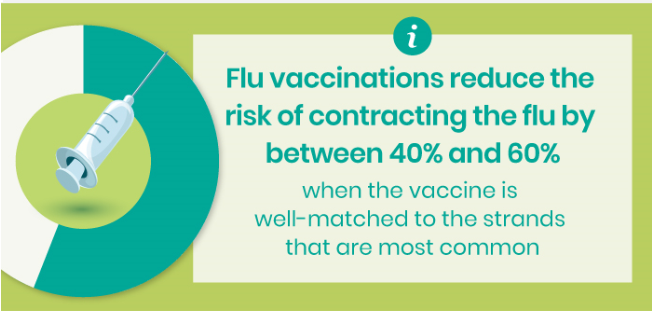The flu, or influenza, is an extremely contagious respiratory illness that is caused by a virus. Each fall and winter is considered flu season, and different strains of the flu can impact people in various areas across the United States. For most people, the flu brings about a mild to moderate illness that lasts one to two weeks. However, some individuals are at greater risk of experiencing complications from the flu, such as older adults, young babies and children, and those with already compromised immune systems. Common flu symptoms include a fever and/or feverish chills, cough, sore throat, headaches, fatigue, runny or stuffy nose, body aches, vomiting, and diarrhea. Not everyone who gets the flu will have all of these symptoms, and the presence of these symptoms do not indicate with complete certainty that the flu is the cause. However, when several of these symptoms set in abruptly and severely, the flu is most commonly the reason.
Educating yourself about the symptoms of the flu is the best way to know what to do if you do get it, but it’s also important to understand how the flu spreads and how you can prevent it in the first place. If you happen to get the flu, you will need to explore flu treatment options so you can stop feeling sick as soon as possible and return to your normal life. At TrueCare, we offer flu treatment options all year round for those with mild to severe cases of the flu, and we can even help you determine if you do, in fact, have the flu or just a common cold. Before we dive in to flu causes, treatment, and prevention, let’s take a look at the common cold and how it differs from the flu, as well as how you can tell the difference between the two.
What Are the Most Common Flu Symptoms?
Flu symptoms will vary based on the individual who is experiencing them and the severity of the flu strand that was contracted. If a person is generally healthy before getting the flu, his or her symptoms will likely be on the milder side of the spectrum. If an individual has chronic health problems or other health concerns, he or she may be more likely to have more severe symptoms or even flu-related complications. While not all people will experience all symptoms, typical flu symptoms include the following:
- Fever or feverish chills
- Runny or stuffy nose
- Sore throat
- Body aches
- Vomiting
- Headaches
- Fatigue
- Cough
- Diarrhea
What Are the Main Differences Between the Common Cold and the Flu?
If you’re feeling sick and need to know if you have a cold or the flu, the best way to find out is to seek medical attention. However, you may be able to determine the severity of your sickness at home which can help you make the best decision on what to do. The main difference between the flu and a cold is the severity of the symptoms as well as the presence of a fever. Colds are not usually accompanied by a fever, and people with colds can usually still take part in their daily activities, though they may feel a little yucky or more quickly run down. A person with the flu will likely have little to no energy and no appetite, and their fatigue can last for several weeks, whereas a person with a cold will only experience symptoms for about a week. Additionally, runny and stuffy noses are more common with a cold than with the flu, while vomiting is more common with the flu.
How Do You Get the Flu?
The flu is extremely contagious. It is completely viral, like the common cold, so once you have it, you become a carrier who can then pass it on to others. The flu can be passed from one person to another through direct contact, such as kissing, sharing cups and utensils, holding hands, and so on. It can also be transferred through objects, such as when one person touches a doorknob that was recently touched by someone with the flu. Additionally, the flu can spread through the air, such as when a sick person coughs or sneezes and their germs travel through to air to infect another individual. It is important to note that not only can flu germs live on a dormant surface for several hours, but people can be contagious before they even start showing symptoms of the flu. This makes prevention even more important as you may not know that you or someone around you has the flu. Being extra cautious can help you avoid transferring and contracting the flu virus.
How Can You Prevent the Flu?
The best way to avoid flu treatment is to simply prevent the flu in the first place. While not everyone will be successful in preventing the flu, the more you do to protect yourself, the less likely you are to get it. Additionally, the healthier you are before getting the flu, the more likely it is that your sickness will be shorter and less severe than it would be otherwise. One way to try to prevent it is by getting the flu shot. Although it is not 100% effective and can have risks associated with it, it can help reduce your chances of getting sick. In healthy adults, flu shot effectiveness is between 40% and 60% when the vaccine matches the most common flu strands. Depending on your age and overall health, the vaccine has different levels of effectiveness, but it has been shown to at least reduce the severity of the flu if it doesn’t completely prevent it.

Other than getting vaccinated, you can take many other measures to prevent the flu. Generally, the healthier you are, the less likely you are to get the flu. This means that you should eat a healthy diet full of plenty of fruits and vegetables, take your vitamins daily, and drink plenty of water. You should also minimize consumption of processed foods and sugars, particularly when you’re starting to feel a little sick, as refined sugars feed disease and can make you sicker faster and for longer. It’s also important to maintain a healthy lifestyle which should include exercising regularly. This helps keep your immune system up and makes your body stronger when it comes to fighting off sickness. Getting enough sleep and keeping your stress levels under control are also hugely important when it comes to flu prevention and your overall health. A lack of sleep and extreme stress levels can quickly wreak havoc on your immune system and your health, and many people struggle to recover from sickness quickly when they are exhausted and stressed. Some people also like to utilize other prevention tips to minimize the risk of getting the flu, such as taking antioxidant supplements, drinking immune-boosting teas, and the like. You can also visit a chiropractor at TrueCare to ensure your central nervous system is functioning well so that your immune system can work optimally.

In addition to maintaining a healthy lifestyle, there are a number of other prevention tips you should take advantage of to stay healthy this flu season.
Washing your hands frequently and thoroughly with soap and warm water or alcohol-based sanitizer is a big part of preventing the flu as it gets rid of any germs that you’ve picked up from others or that have come from your own body.
Wear a mask when indoors at public places or crowded spaces. Wearing a mask can protect babies and young children who do not yet have immunity and are too young to wear a mask themselves.
Minimize contact with sick individuals, if possible. This can be challenging if you’re caring for a sick family member or if you work in certain fields that require close contact with others, but do your best to keep your distance from people who are sick. If you can’t avoid interacting with sick individuals, or even if you can, you should also minimize how much you touch your face, particularly your eyes, mouth, and nose. If you do have germs on your hands, they can be washed away before you breathe them in if you keep your hands away from your face.
Whether you have the flu or not, always try to cough or sneeze into a tissue or napkin rather than your hands. If you don’t have a tissue, it’s better to sneeze into your elbow or shoulder than your hands as well.
Finally, follow attendance policies regarding sickness at your workplace and your children’s schools. Generally speaking, you should be fever-free for 24 hours and have no symptoms before you return to work or school. Even if you test negative for COVID-19, stay home if you have symptoms. While these things may not prevent you from getting the flu, they can help you to avoid getting sick and at the very least will minimize the spreading of the flu if you or your children get sick.
How Do Flu Shots Work?
Antibodies are the things responsible for helping our bodies fight off sicknesses. When we get a flu shot, a small amount of deactivated flu viruses is injected into our bodies, along with other ingredients that play a role in preservation, stabilization, and more. The viruses come into our bodies through the vaccine and our immune system is alerted, kicking into gear to create antibodies against the virus. This typically takes about two weeks, after which we will have antibodies that can effectively protect us should we come into contact with one of the flu strands that we were vaccinated with.
Who Should Get a Flu Shot?

The Center for Disease Control recommends that everyone over the age of 6 months should get vaccinated against the flu each season, with a few exceptions. If an individual has a health history that deems them exempt from a flu shot recommendation, they should not get a flu shot. This includes individuals with a history of Guillain-Barre Syndrome (GBS), those with life-threatening allergies to the ingredients in the flu shot, and more. If you have an allergy to eggs, gelatin, antibiotics, formaldehyde, aluminum, or mercury, you should talk to your doctor about the safety of getting a flu shot, since all of these are common ingredients in flu vaccines. If you’re not feeling well at the time of your flu vaccine appointment, you should talk to your doctor about your symptoms and consider rescheduling your appointment, since you increase your likelihood of getting sicker if you get a flu shot when you’re already not feeling well.
When Should I Get a Flu Shot?
Flu season changes slightly each year, and it can be hard to predict the timeline of when the flu will be at its peak. Generally, flu season lasts from late fall to late winter, but it can start earlier or end later. When you’re deciding when to get a flu shot to maximize flu prevention, you should take into consideration the previous years’ flu seasons and when the peaks occurred.
You don’t want to wait too long to get a flu shot, since you increase your likelihood of getting the flu by doing so. It also takes about two weeks for your body to produce the antibodies necessary to fight the flu, so you want to give your body time to adjust and adapt before you’re exposed to the flu virus. Generally speaking, the CDC recommendation is that people get their flu shots before the end of October, as peak season tends to fall between December and February in most cases. If you are unable to get your flu vaccination before October is over, it’s still a good idea to get it done after then, as it will still help protect you in the coming winter months when the flu is at its peak.
At the same time, you don’t want to get your flu shot too early in the season, as that has been linked to reduced flu protection in the later winter months. Getting your flu shot in July or August is considered too early in most cases, especially since those months tend to be hotter and the flu cannot survive well in warmer temperatures. Some children may be recommended to get two doses of the flu vaccine, and they need to be given at least 4 weeks apart. In this instance, getting the first flu shot a tad earlier than you normally would can be beneficial, since it gives you more time to get that second dose done before the peak time, allowing you to maximize its effectiveness early on.
What Are the Side Effects of Flu Shots?
Most people do not experience negative side effects from the flu. However, a number of people do have negative reactions to getting flu vaccines. While it’s up to each individual and family to weigh the risks versus benefits of getting vaccinated for flu prevention, it’s important to be educated about the possible side effects and risks of getting a flu shot.
The most common reactions are minor and short-lived. These include soreness, tenderness, and redness at the injection site, as well as muscle aches, a low fever, and headaches. These side effects may be the body’s response to the flu virus itself, or it may be more about the body’s response to the various ingredients in the flu shot. In some cases, extreme and severe reactions may occur, in which case individuals should seek out emergency medical care. Serious reactions include hives, weakness, dizziness, breathing problems, and a fast heartbeat. These may be indicative of an allergy or other issue related to how your body is interacting with the vaccine, and you should try your best to determine the cause of the reaction so that you can avoid it in the future.
What Are the Best Treatment Options for the Flu?
If you think you have the flu, it’s best to seek treatment sooner rather than later. Even though the flu is viral and cannot be eradicated with antibiotics, getting ahead of the sickness will help minimize its length and severity. Schedule an appointment for flu treatment as soon as you suspect you have the flu, and begin taking better care of yourself by eating well, drinking plenty of fluids, and getting enough rest as soon as you begin feeling sick. At your doctor’s appointment, you may be given an antiviral medication. This can help reduce the severity of the symptoms and may even shorten the time you are experiencing flu symptoms. Antivirals may also be prescribed as a preventative measure if someone you’ve come in close contact with has the flu or if there is a severe outbreak in your area.
If you are at a high risk of developing complications from the flu, it is especially important that you get flu treatment quickly. Even if you’re not considered “at risk,” you could still develop bronchitis, pneumonia, ear infections, sinus infections, and other secondary issues that could prolong your sickness. The best thing to do is be proactive as soon as you start feeling a little sick. This means drinking more water, eating more foods with antioxidants, doubling up on important vitamins or minerals, and minimizing stress levels, all the while maximizing that amount of time that you’re sleeping.
If you want to learn more about the flu, preventing the flu, treatment of the flu, or anything related, get in touch with TrueCare today. We offer same-day appointments at most of our locations, and we can provide a number of health care services for you and your whole family, from sickness care to wellness care and everything in between. We are proud to be a leader in affordable health care in North County San Diego and Riverside Counties and look forward to serving you and your family.
DISCLAIMER: THIS WEBSITE DOES NOT PROVIDE MEDICAL ADVICE
The information, including but not limited to text, graphics, images, and other material contained on this website, are for informational purposes only. No material on this site is intended to be a substitute for professional medical advice, diagnosis, or treatment. Always seek the advice of your physician or other qualified health care provider with any questions you may have regarding a medical condition or treatment and before undertaking a new health care regimen. Never disregard professional medical advice or delay in seeking it because of something you read on this website.





